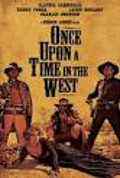
Directed by
Sergio Leone
165 minutes
Rated M
Reviewed by
Bernard Hemingway


Once Upon A Time In The West
Never has the Western been elevated to such monumental and even, some might say, deliciously over-blown proportions as in this icon of the genre in which a mysterious loner known as Harmonica (Charles Bronson) doggedly pursues Frank (Henry Fonda) a ruthless enforcer for the railroad which is cutting its civilizing way through The Old West.
Scripted by Leone and Sergio Donati and based on a story by Leone, Bernardo Bertolucci and Dario Argento and amply helped by Tonino Delli Colli’s glorious cinematography and Ennio Morricone’s marvellous score, to call Once Upon A Time In The West a Spaghetti Western is to do it a serious dis-service.
Leone often seems to be seeing just how long he can sustain a single shot, lingering over moments from which any other director would have long moved on. This purposefully studied approach tends to produce a surfeit of form over substance but for once quite satisfyingly so particularly for film buffs who will recognize the many direct quotations from classic Hollywood Westerns. From the opening sequence (lifted from Fred Zinneman's High Noon, 1952) in which Frank's hirelings (Jack Elam and Woody Strode) stake out the local railway station to execute Harmonica (although it is never explained why) to the final brilliantly-staged showdown between Frank and Harmonica the film is a masterpiece of style, even the effects of the awkward dubbing of the Italian actors and the at-times risibly exaggerated sound effects managing to be absorbed by the film's stately pacing.
The relatively simple plot is cleverly eked out by the elliptical script and judicious editing so that it is only in the final minutes of the film that we understand what has been going on. Charles Bronson does a solid job as the phlegmatic avenger, Henry Fonda, cast against type, stands out as the psychopathic hired gun whilst Jason Robards turns in a suitably roguish performance as Cheyenne and Claudia Cardinale is an unlikely but nevertheless eye-catching Irish settler's wife, a strumpet and near-surrogate mother to the three males.
Shot on location in Spain, with side-trips to Arizona and Utah and interiors filmed at Cinecittà it is a fabulous-looking film that makes maximum use of the Cinemascope format and is helped by a first class production design. My only misgiving is the use of Harmonica's theme tune which always appears to be part of the soundtrack even when it is supposed to be part of the filmed scene, an effect which of course works in musicals but is discordant here.
Want something different?





